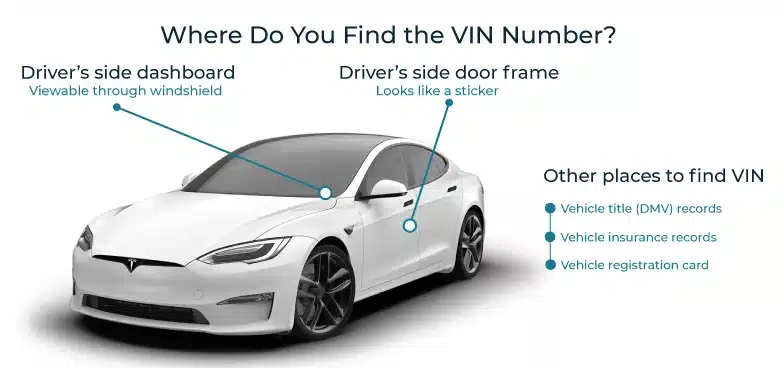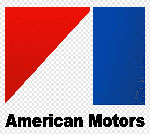
AMC Recall Check
Before buying any used AMC, run a recall check to uncover safety issues. With just A VIN, you’ll see if your car has outstanding safety repairs. This quick report helps you avoid future risk, ensures confidence on the road, and protects the true value of your vehicle.
What is an AMC Recall?
American Motors Corporation (AMC) cars were bold and a bit rebellious. But bold doesn’t mean immune. When testing, owner complaints, or investigations point to a safety defect, the National Highway Traffic Safety Administration (NHTSA) oversees a recall, and the manufacturer must notify owners and provide a free fix.
EPA can also order recalls when emissions systems fail in real use. Although AMC no longer exists, Chrysler’s 1987 acquisition (now Stellantis) means the history is still documented and traceable.
Why Checking the AMC Recall History is a Must
Before investing in a classic AMC. It’s essential to check its recall history. By running the VIN, you’ll uncover whether past safety defects were ever addressed. This protects you from hidden risk and ensures your safety and the car’s authenticity.
Dodge AMC Safety Risk
Recall history is essential for classic AMC (especially since its original manufacturer is long gone). Defects in original components may still exist if never addressed. Researching recalls ensures risks are resolved, protecting both passenger safety and the charm of these classic vehicles.
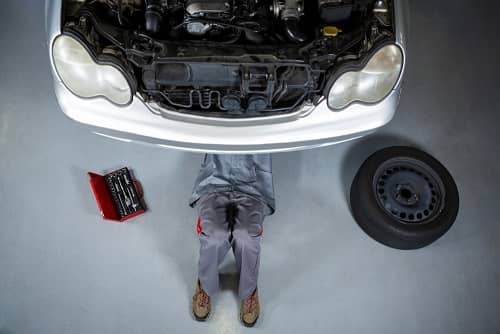
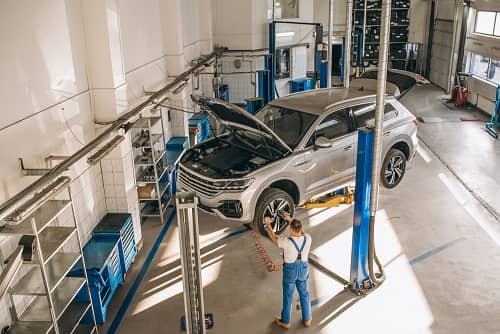
Compliance
In the absence of an active manufacturer, AMC owners face unique compliance challenges. Many regions now have stricter requirements for emissions, lighting, and structural safety than when these cars were built. Recalls tied to compliance can bridge the gap between vintage engineering and modern regulations, and make them more roadworthy under current laws. Helping avoid legal restrictions and preserve collectible value.
Inspect typical AMC safety faults
AMC is primarily known for its innovative approach to the automotive market. While innovative, they came with safety quirks. A recall check reveals these unresolved defects, safeguarding your safety and the car’s rare appeal.

How to Run AMC Recalls?
Get the AMC recalls report in under a minute by following these simple steps below.

Locate Your AMC VIN
Have your AMC Vehicle Identification Number (VIN) ready. Classic car VINs usually have 5 to 14 digits. You can find the AMC VIN on the dashboard (driver’s side), driver’s door area, engine compartment, inside cabin, or on AMC paperwork. Our lookup service works on classic AMC models.


Enter your details
Click on the form above, then fill it out with the information or your VIN. Then, click on the button to begin the process. Don't have the VIN? You can use your license plate number instead.


Receive Your AMC Recall Report
Wait for a few seconds for the AMC recalls report to be generated. Detailing any open recalls or safety notices.
What Will You Find With an AMC Recall Check?
Inside your Detailed Vehicle History report, the AMC recall check lists every safety recall detail tied to your VIN. For each campaign, you’ll see the issue date, the affected AMC component/system, the risk summary, and the official remedy. So you know exactly what to do next.
In the recall report, you’ll get:
- Date of recall: Shows when NHTSA/EPA and the manufacturer issued the recall and when owner letters were mailed. Useful for judging urgency and confirming the record is current.
- Affected component (AMC): Pinpoints the exact AMC part or system (e.g., ignition wiring) so you can speak clearly with any dealer or mechanic.
- Remedy (free fix): Explains the manufacturer’s no-cost repair and what’s covered, helping you plan the visit and avoid out-of-pocket surprises.
- Campaign IDs: Lists the NHTSA recall number and any manufacturer code to match what service advisors see in their systems.
- Next steps for your AMC: Confirm if your AMC is included, check open/closed status, and schedule repairs with an authorized service center.
An AMC vehicle history report also includes mileage records, title check records, accident records, theft records, and many more. Review the records below to see more
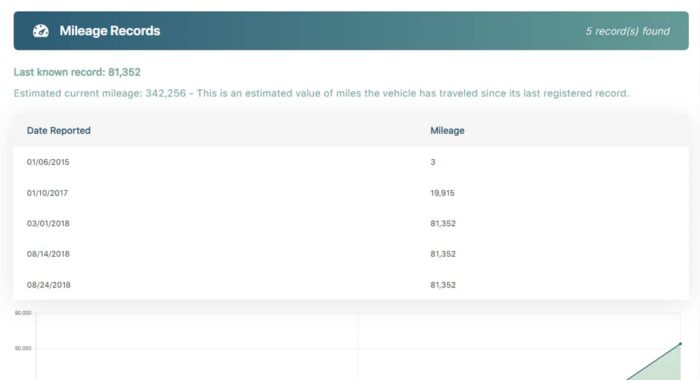
Odometer Readings
Mileage consistency protects you from rollback scams and supports warranty or goodwill claims on older campaigns.
Title Check Records:
Salvage, flood, or lemon branding changes how recall repairs are handled and what a buyer will accept. Your report makes the legal picture clear.
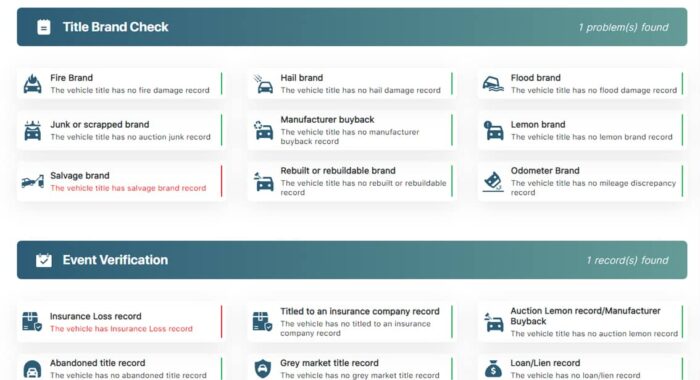

Accident Records:
Crash history helps you spot structural repairs or airbag deployments that intersect with recall fixes (e.g., seat or restraint work).
Theft Records
Discover if the AMC has theft records. An active theft flags complicate transfer and can pause recall work until cleared.

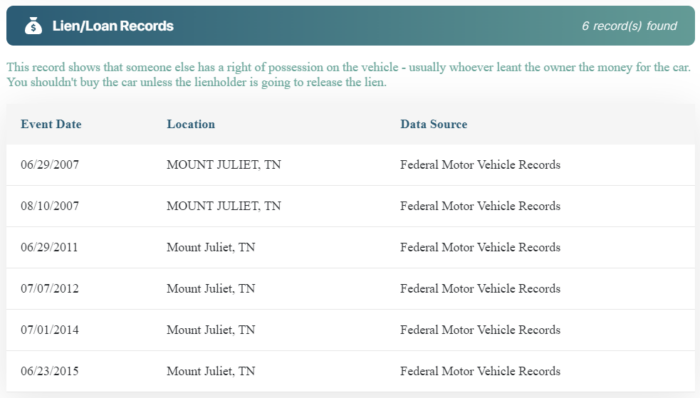
Loan & Lien Information
Open liens can complicate sales or reimbursement claims. Know the loan/lien status of the AMC before you buy or list.
Ownership Records
Ownership count, dates, and locations paint a clearer picture of how the AMC was used and cared for. Useful when pairing recalls with wear/tear patterns.
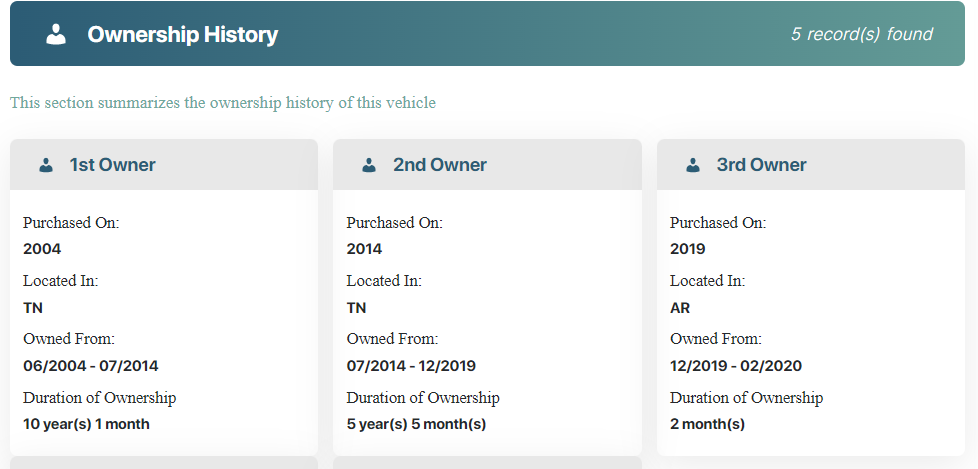
Common Issues Leading to AMC Recall
Below is a straight-shooting breakdown of real, documented AMC recalls. What failed, why it mattered, and how it was fixed. I grouped them by risk, from “could stall or catch fire” down to “compliance clean-up,” and I’ve included the official NHTSA campaign numbers (and EPA actions where relevant) so you can verify every line.
Below are some of the reported causes:
Emissions system defect (EPA-ordered recall, 1978)
In May 1978, the U.S. Environmental Protection Agency ordered American Motors Corporation to recall a large group of vehicles, about 270,000 of the 1976 AMC passenger cars plus roughly 40,000 of the 1975–1976 Jeeps and postal trucks, because a faulty back-pressure sensor in the emissions-control system could fail after months of use.
The part (supplied by Eaton) led engines to emit excess nitrogen oxides (NOx) beyond legal limits. EPA officials emphasized the public-health stakes (smog formation; breathing problems, especially in children). AMC had already launched a smaller, voluntary campaign earlier that year; EPA’s action expanded it decisively. The remedy at that time is to replace the defective sensor and restore compliance.
Affected models (contemporaneous reports): 1976 AMC passenger cars commonly cited include Hornet, Gremlin, Pacer, and Matador, with additional counts for 1975–1976 Jeeps and mail trucks.
Why this matters: Although it was an emissions (Clean Air Act) action rather than a safety recall under NHTSA, it functioned like one.
Ignition module connector (1978 safety recalls)
This recall was filed around March 1978. A faulty ignition module connector/wiring could interrupt power and stall the engine. About 525,000 AMC cars and Jeeps from 1974–1976, including the Gremlin, Hornet, Matador, and Pacer.
Rear axle recall (1978 safety recalls)
This recall was filed around August 1978, and a public announcement followed in October. Possible rear axle shaft or hub failure that could lead to wheel separation and loss of control. Certain 1977–1978 Jeep J-Series trucks and Wagoneer models. The vehicle count was much lower than the ignition recall.
Understanding the Recall Process from Classic AMC’s Cars
For a discontinued brand like AMC, recalls function less as repair opportunities and more as important historical safety records. While no factory remains to service the defects, these notices still inform owners about known issues that could affect safety or performance. For collectors, awareness of such records helps maintain authenticity and value while ensuring the car is roadworthy. You can explore how their recall process works below
Reporting a Problem
Even though the AMC company no longer exists, owners can still report suspected safety defects to the NHTSA. These reports contribute to a centralized safety database, allowing patterns to emerge across the small surviving population of AMC cars. Every documented issue helps protect the collective knowledge of this rare and unique vehicle’s history.
Investigation
Once a complaint is submitted, the NHTSA reviews it for merit, assessing whether the alleged defect poses a genuine safety risk. For classics like the AMC SV-1, this often involves examining historical service records, owner testimonies, and any preserved manufacturer documentation. This step ensures that only credible and significant issues are pursued further.
Recalls Management
If an issue is confirmed as a safety defect, the NHTSA will issue an informational recall. Without an active manufacturer, there’s no direct repair program, but the recall notice becomes part of the official record. This data is vital for collectors and restorers, as it flags areas that may require preventive maintenance or specialist intervention.
How Vehicle Recalls Are Handled?
With no manufacturer to repair them, fixes come from specialty shops or owners themselves. Here’s the full explanation.
The Manufacturer (Automaker/Successor)
When a safety defect or noncompliance is found, the automaker is legally on the hook. For AMC vehicles, that responsibility moved to Chrysler in 1987 and now sits with Stellantis. Once a defect is confirmed, the company must submit a Part 573 defect report to NHTSA within five working days. That report explains what failed, the risk, which vehicles are affected, and the planned remedy, and the company must also maintain owner and dealer lists for notification and campaign tracking.
However, the free safety-recall remedy isn’t legally required if the vehicle’s first retail sale was more than 15 calendar years before the recall notice (for tires, the limit is five years). Within those limits, fixes are free; beyond them, any help is goodwill and not mandated.
Old recalls don’t vanish, though. The record of the recall remains, even if the free-repair duty has ended. For older AMCs, it’s normal if very old campaigns don’t show in the NHTSA VIN tool, especially when the vehicle uses a pre-1981, under-17-character VIN. But don’t worry, Detailed Vehicle History can decode classic AMC VINs and surface the supporting history.
NHTSA’s Role
NHTSA maintains an accessible online database of recall notices, even for long-defunct brands. It acts as the central point for safety data, informing owners of historical problems and offering guidance on how to address them. In the absence of a manufacturer, NHTSA’s role shifts from coordination of repairs to preservation of vital safety information.
However, NHTSA’s public VIN lookup mainly shows safety recalls for roughly the last 15 years, so older campaigns (say, 1975) may not appear in the standard search. With Detailed Vehicle History, we can decode classic AMC VINs and pull supporting history records, so you still get clear guidance on what your car needs and what’s already been done.
Your Role as the Vehicle Owner
Owning an AMC means being part of a small but passionate community. AMC ceased operations in 1987; there is no longer a corporate entity to organize and fulfill recall campaigns. Much of the support for addressing recalls comes from enthusiast clubs, online forums, and restoration groups that share repair tips, parts sources, and historical data.
Since the process for classics is less formal, tapping into these communities is essential. A comprehensive vehicle history report can help you verify past recalls and other significant records, ensuring your collectible remains safe and well-documented.
Get AMC Window Sticker by VIN
For classic vehicles like AMC, a window sticker (often called a Monroney label) by VIN is more than a label. It’s a piece of history. It reveals the original specifications, trim, factory options, colors, safety features, and MSRP when the car first rolled off the line.
Getting the window sticker not only validates a vehicle’s originality but also adds its collectible status. When paired with a recall check, it provides both the history and safety insight you need before investing
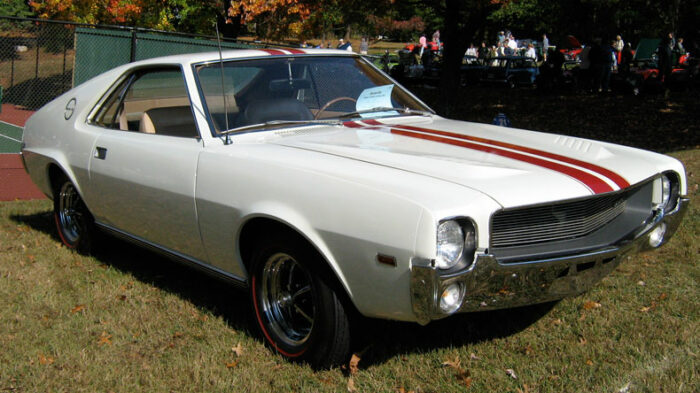
Why Use Detailed Vehicle History to Check AMC Recalls?
At Detailed Vehicle History, we provide more than just basic recall data. We deliver a complete view of your AMC’s past. From the specifications and mileage logs, title check, ownership changes, accident history, auction listing, lien status, and more.
With a vehicle history report, you can uncover hidden issues before you buy and make a safe, informed choice.
Recall Check For Others Manufacturers
FAQ about AMC Recalls Check
What does "AMC" mean on a car? (What's the full form?)
On a car, “AMC” can refer to American Motors Corporation, an American automobile manufacturer that existed from 1954 to 1987. They produced cars like the Gremlin, Javelin, and Pacer, as well as Jeep vehicles, but discontinued the AMC Brand except Jeep after Chrysler acquired them in 1987. But for now, it is better known as an Annual Maintenance Contract.
What is an AMC report?
An AMC report car generally refers to a car that is covered under an Annual Maintenance Contract (AMC), or a car that has an AMC history, often referencing the historical American Motors Corporation (AMC).
Why is checking for AMC recalls required or important?
Checking for active recalls on your AMC vehicle is crucial for safety. Even though AMC is no longer in business, a recall check can help identify any potential safety issues that could endanger the occupants of a vehicle. This can help reduce the risk of injury or death by ensuring that all recalls and safety updates have been addressed.
Why did AMC fail? (What happened to the company?)
AMC faced financial difficulties and was acquired by Chrysler (now part of Stellantis) in 1987, including the Jeep brand and responsibility for vehicle warranties and recalls. Several factors contributed to AMC’s decline and eventual acquisition, including changing market conditions, the rise of Japanese automakers, and challenges in adapting to evolving consumer preferences.
What is the best VIN check website?
For affordable and reliable VIN checks, Detailed Vehicle History is a top choice. Reports start at $19.99 and include data on accidents, titles, mileage, liens, auction photos, and recalls. Users praise its accuracy, easy-to-read layout, and responsive service. With a built-in recall check, it’s ideal for buyers, sellers, and dealers seeking confidence and safety.

